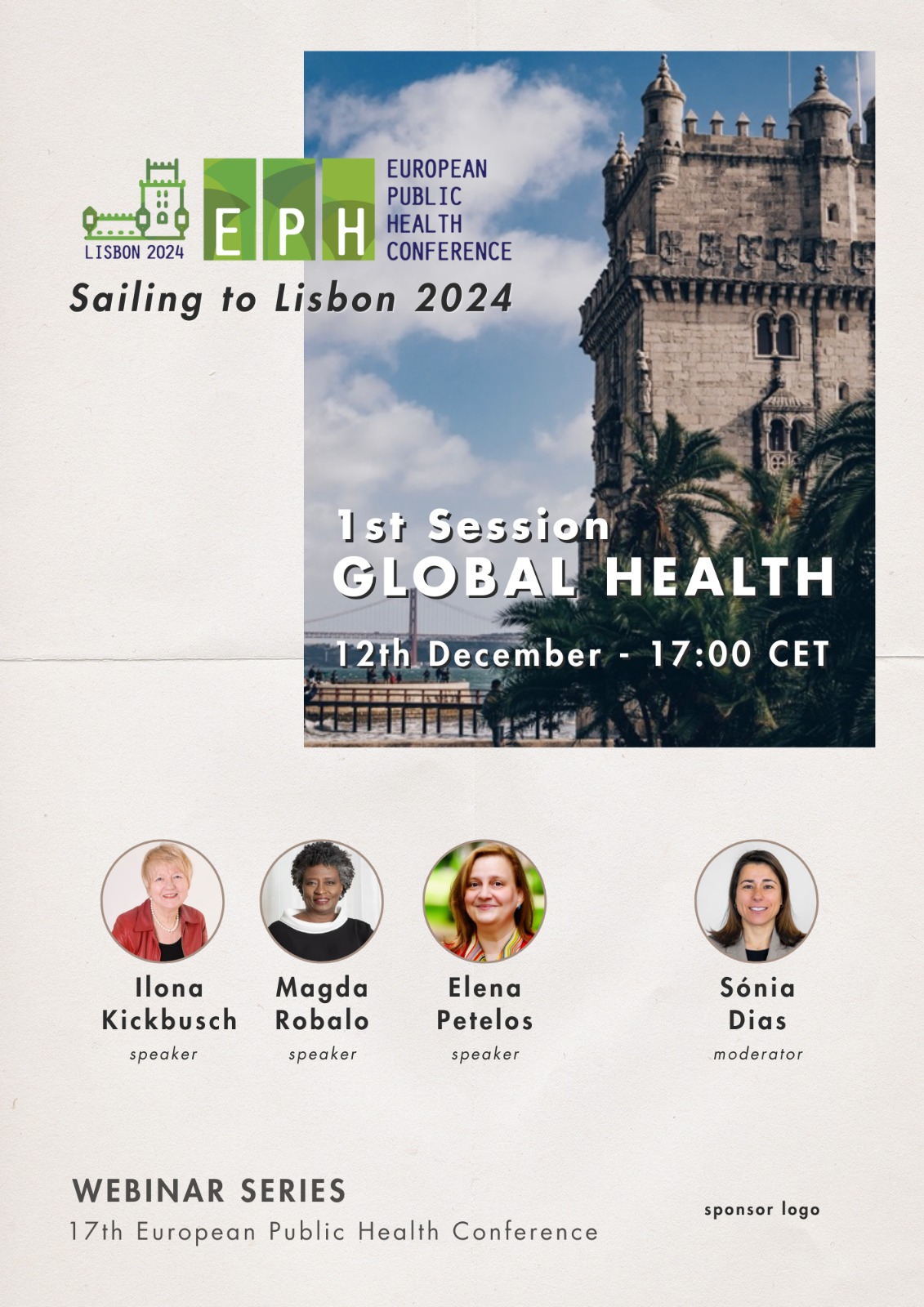Webinar agenda
Webinar on Global Health
December 12 , 2023 - 17:00-17:00 CET
Organised by: EPH Lisbon host
 Moderator:
Moderator:
Sonia Dias, chair of the International Scientific Committee Lisbon 2024
Speakers:
Ilona Kickbusch, Founder and Chair of the Global Health Centre at the Graduate Institute of International and Development Studies in Geneva, Switzerland
Magda Robalo, former Minister of Health Guinea Bissau, Institute for Global Health and Development (IGHD), Guinea Bissau
Elena Petelos, Senior Research Fellow in Public Health, University of Crete, Greece, and Maastricht University, Netherlands, President EUPHA Global health section
They will share profound insights drawn from their extensive expertise in public health, epidemiology, and healthcare management. Join us in shaping impactful conversations around global health challenges and solutions, exploring innovative approaches for a healthier, more equitable world. Don't miss this opportunity to contribute to meaningful change!
Follow the webinar LIVE on X (formerly Twitter): @EPHConference and APPSP and ANMSP social media.
Past webinars
EUPHA members can watch the recordings of webinars in the EUPHA Resources Module. The module can be accessed through the link in your personal account!
Beyond the Present: Utilising the Wellbeing of Future Generations Act to address health inequalities in Wales
November 24 , 2023 - 11:00-12:00 CET
Organised by: EUPHA-FOR
Sara Elias from the Future Generations Commissioner of Wales presented the webinar.
WHO Global Health Foresight: looking forward to best harness the power of science and research
September 22, 2023 - 11:00 - 12:00 CET
Organised by: EUPHA-FOR
Presented by Marion Laumonier and Anna Laura Ross, from the World Health Organization.
This webinar will focus on the monitoring of scientific advances with a global health perspective.
The Ghosts of Christmas - Stories on Foresight
June 16, 2023 - 11:00 - 12:00 CET
Organised by: EUPHA-FOR
Presented by Dr Artur Furtado, Head of the Disease Prevention and Health Promotion unit of the European Commission.
Evidence-Based Public Health: The Contentious Interface Between Evidence and Public Health
May 8, 2023 - 15:00 - 16:30 CET
Organised by: EUPHA-EPI, Stanford University, METRICS, Universita Cattolica sel Sacro Cuore
Webinar powered by: EUPHA
The EUPHA Public health epidemiology secion (EUPHA-EPI) is pleased to invite you to this webinar on evidence-based public health with Professor John Ioannidis, from Stanford University.

This webinar is aimed at exposing the European public health epidemiology community to the crucial role of evidence to guide public health for both chronic problems and acute crisis circumstances. Dr. Ioannidis will address the significance of valid data generation, collection, and interpretation, with examples from both chronic diseases and challenges encountered during the COVID-19 pandemic. The discussion will emphasize the vital function of public health epidemiologists in generating and using reliable, transparent, reproducible evidence, shaping policy decisions.
More information here.
30 years of the Dutch Public Health Foresight Study– Lessons Learnt
April 14, 2023 - 11:00 - 12:00 CET
Organised by: Dr Henk Hilderink, EUPHA Foresight section president
This Webinar will present experiences and lessons learnt of foresight studies implemented in the Netherlands over the last 30 years.
Modelling healthcare expenditure by disease in OECD countries
March 30, 2023 - 14:00 - 15:30 CET
Organised by: OECD and EUPHA-ECO
During the virtual seminar, we will discuss two recent works on attributing healthcare expenditures to diseases. A specific focus of the discussion will be on the methodological challenges and the policy implications of such cost-of-illness analyses for OECD countries. The University of Melbourne will present a country-level model that has been used in a simulation study achieving SDG 3.4. The OECD Secretariat will outline an AI-based model relying on patient-level data that is used in the OECD microsimulation model for Strategic Public Health Planning for non-communicable diseases (SPHeP-NCD) to assess the cost-effectiveness of prevention interventions. The Secretariats will also discuss the benefits of this project to policymakers and information on how countries can get involved.
Attendees will have the opportunity to discuss both methodologies and real-world applications and exchange views with academics part of the EUPHA.
More information here.
International Women’s Day - Health policy and global health crises: why we need feminist intersectional approaches and what to learn from COVID-19?
March 7, 2023 - 19:00 - 20:00 CET
Organised by: EUPHA-HWR, EUPHA-PHPP, EUPHA-SGMH, EUPHA-MIG, EUPHA Working Group on SDG5, EUPHAnxt
Webinar powered by: EUPHA
We invite you to join us in celebrating (the evening before) 8 March International Women’s Day and critically reflect on the lessons to be learned from the COVID-19 pandemic. An international group of speakers seeks to highlight policy gaps and discuss how gender inequalities exacerbated in the shadow of a major global health crisis and how they intersect with other inequalities and new migration flows. Why did health policy failed so badly to protect women, minorities, and vulnerable groups, and what role did public health play? The webinar seeks to explore ways to create a ‘new normal’ that is better equipped to protects human rights, equality and equality, and the crucial role of feminist networks and research.
Find more information here.
Virtual round table on women's rights and human rights
March 8, 2023 - 16:00 - 17:00 CET
Organised by: EUPHAnxt, EUPHA working group on SDG5 and others
Find more information here.
Stepping up the Prevention of Violence Against Healthcare Workers
March 13, 2023 - 14:30 - 15:30 CET
Organised by: EHMA and EUPHA-HWR
This webinar is a call for unity and mobilisation, and to explore opportunities to better address the presence of increasing violence against healthcare workers.
- To create a sense of urgency.
- To explore the policy problem.
- To connect different perspectives.
- To identify opportunities for action.
This webinar responds to a ‘call for action’ published this month in the European Journal of Public Health; Violence against healthcare workers is a political problem and a public health issue; doi:
10.1093/eurpub/ckac180
Find more information here.
Migrant healthcare workers during the COVID-19 pandemic: why we should worry about health systems and governance
March 14, 2023 - 14:00 - 15:00 CET
Organised by: GLOHRA Project PROTECT, in collaboration with EUPHA Health Workforce Research (EUPHA-HWR) and Public Health, Babeș-Bolyai University, Romania
Chairs: Ellen Kuhlmann and Marius Ungureanu
Hosts: Marius Ungureanu and Monica Brînzac, Babeș-Bolyai University, Romania
Webinar powered by: EUPHA
Migrant healthcare workers played a crucial role in maintaining healthcare delivery and resilience of the health system during the COVID-19, but were largely absent from pandemic policy, and the literature highlights inequalities and structural racism. This webinar calls for greater attention to migrant HCWs. However, simply adding the migration status is not enough.
We introduce an intersectional health system-based approach. Results from the German PROTECT project will be contrasted with the situation in the United Kingdom and Brazil, where evidence of disadvantages of migrant healthcare workers seem to be strongest. Key stakeholders in the field will comment and add evidence from a health system, management, profession and policy perspective, thus stimulating critical debate and policy solutions.
Find more information here.
How can policymakers incorporate uncertainty (as modelled through foresight) into policy evaluation
February 24, 2023 - 11:00 - 12:00 CET
Organised by: EUPHA Foresight section
Webinar powered by: EUPHA
This webinar will be hosted by Dr. Ana Vieria, Assistant Professor of the Centro de Estudos de Gestão do Instituto Superior Técnico, in Portugal. The webinar will present a socio-technical framework to measure the desirability of public policies and their doability applied in Lisbon’s urban health policymaking setting and discuss insights regarding the role of scenario analysis in the appraisal and selection of policies.